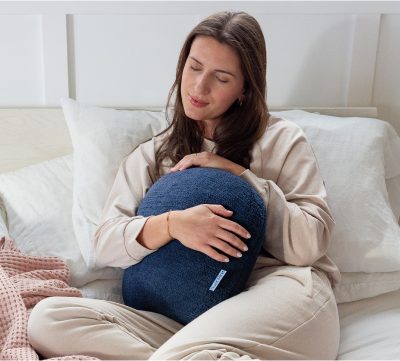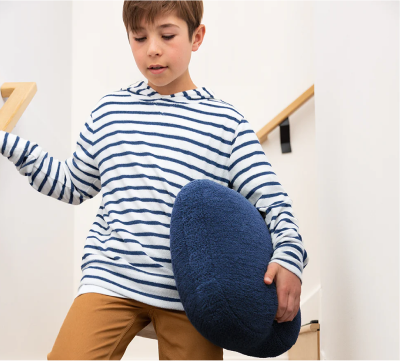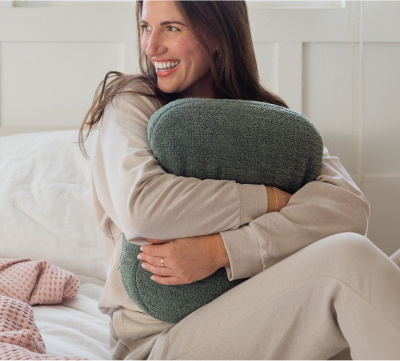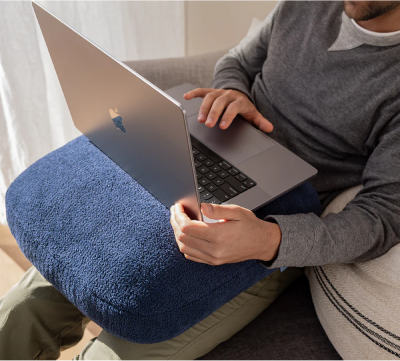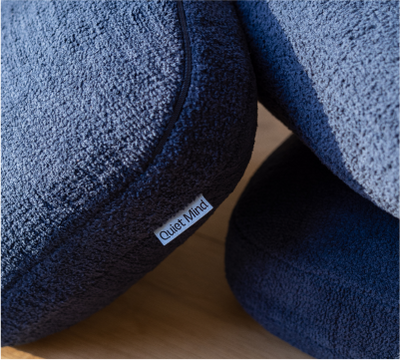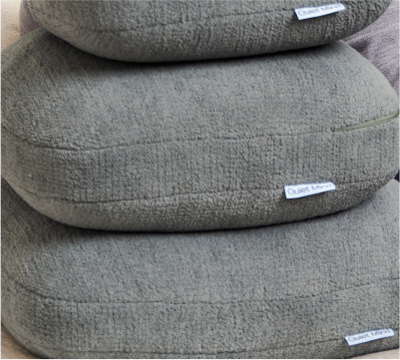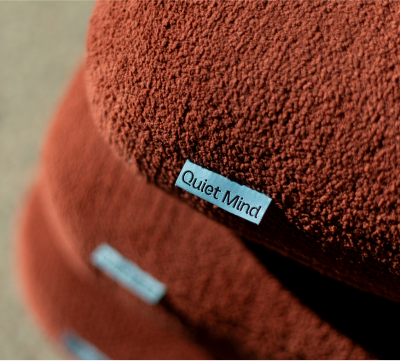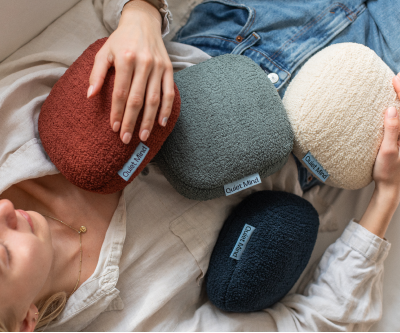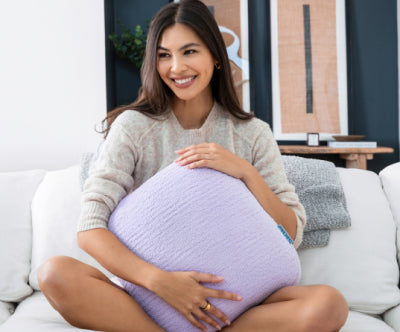Anxiety, at its core, is the mind's call for stillness. If you’re asking what the best thing to take for anxiety is, you’re already paying attention, and that’s the beginning of healing.
There is no single answer. But there are many gentle, effective paths forward.
Understanding Anxiety: A Mind in Overdrive
Anxiety is not just worry. It’s a full-body experience, often rooted in the nervous system and magnified by thought patterns, sensory input, and emotional overwhelm. It can feel like a racing heart, shallow breath, knots in your stomach, or an inability to feel grounded or safe.
Common anxiety symptoms include:
-
Muscle tension or restlessness.
-
Trouble concentrating.
-
Irritability or emotional sensitivity.
-
Sleep disturbances.
-
Racing thoughts or fear of the future.
- Fatigue and digestive issues.
These physical symptoms often go hand-in-hand with mental distress, creating a loop that can be hard to interrupt without the right support.
If these symptoms of anxiety start affecting your relationships, focus, work, or sense of joy, it may be a sign of a deeper mental health condition and a cue to explore a supportive treatment plan.
Types of Anxiety: Different Forms, Common Threads
Understanding what kind of anxiety you're experiencing can help clarify which tools or treatments may relieve anxiety most effectively.
-
Generalized Anxiety Disorder (GAD): Ongoing worry or dread over daily life.
-
Panic Disorder: Sudden and intense panic attacks with physical symptoms.
-
Social Anxiety: Fear of being judged, watched, or rejected.
-
Phobias: Strong fears linked to specific triggers, like flying or heights.
- Anxiety and Depression: Often co-occur, influencing each other in a cycle of low mood and heightened worry.
Each form may respond differently to various anxiety treatment options. A psychiatrist or licensed therapist can help identify the type you’re experiencing and recommend how to treat anxiety based on your needs.
What to Do for Anxiety in the Moment
When anxiety flares, it’s natural to want fast relief. Whether you're facing an overwhelming task or a restless night, some tools and techniques may gently soothe your anxiety.
Breathing and Sensory Grounding
Simple, conscious breathing can shift your body from stress to calm. Try this:
Inhale through your nose for four counts, hold for four, exhale for four, and hold again. Repeat slowly, gently. This technique is known as 5-4-3-2-1 Coping Technique and it calms the nervous system.
Pair this with grounding: feel your feet on the floor, run your fingers over a textured object, or notice five things around you. These sensory anchors bring the mind back to now.
Gentle Tools for Fast Relief
-
Diaphragmatic (belly) breathing.
-
Some drinks, like herbal teas, help ease anxiety and calm the mind.
- Holding a smooth stone, stress ball, or grounding object.
These practices don’t erase anxiety, but they create a quiet space. A moment to reconnect with your breath, your body, and your sense of safety. Another tool, Quiet Mind’s scented weighted pillows, offer gentle pressure and soothing aromatherapy, supporting emotional grounding when the nervous system feels overwhelmed.
Natural Remedies: Thoughtful Support from Nature
Nature offers calm in its own language. When paired with awareness, certain supplements may help support your body’s stress response.
Magnesium, Ashwagandha, and L-Theanine
-
Magnesium plays a key role in regulating the body's stress response. Low magnesium levels are linked to heightened sensitivity to stress, muscle tension, and difficulty sleeping, all common symptoms of anxiety. Supplementing with magnesium may ease nighttime restlessness and support more balanced mood rhythms.
-
Ashwagandha is an adaptogenic herb long used in Ayurvedic medicine. It helps the body regulate cortisol, the hormone released during stress, and may promote emotional steadiness. Some small studies have shown promising results for Ashwagandha's ability to relieve anxiety over time.
- L-Theanine, a calming compound found in green tea, supports alpha brain wave activity associated with a state of calm yet alert focus. It may help reduce overstimulation without causing drowsiness, making it a popular natural option for situational anxiety or overwhelm.
Together, these nutrients are often used to treat mild anxiety naturally. They may help improve stress tolerance, ease tension, and promote restful sleep; all without major side effects. Still, they are not substitutes for a comprehensive treatment plan, especially when anxiety becomes severe or persistent.
Omega-3s and B-Complex Vitamins
-
Omega-3 fatty acids, especially EPA and DHA, support brain structure and function. They have been studied for their role in emotional regulation and reducing anxiety symptoms, particularly in those with low dietary intake or mood instability. Some people also find that omega-3s support clarity of thought during periods of stress or depression.
- B-complex vitamins, particularly B6, B9 (folate), and B12, play an essential role in neurotransmitter production, affecting serotonin, dopamine, and GABA levels. Deficiencies in these vitamins have been linked to increased vulnerability to anxiety and depression. Supporting your nervous system with adequate vitamins help reduce anxiety, and also might enhance energy, focus, and emotional resilience.
These supplements are often available over the counter, but that doesn’t mean they’re risk-free. A doctor may recommend lab testing or dosage adjustments, especially if you’re managing a mental health condition or already take medication. Combining supplements with prescriptions should always be guided by a provider.
Medical Options: When Professional Care is Needed
For some, natural approaches may not be enough. Prescription medication can offer meaningful relief when anxiety is persistent or severe.
SSRIs, SNRIs, and Benzodiazepines
Medications used to treat anxiety work by regulating brain chemistry and calming overactive stress responses. The type of medication prescribed will often depend on your symptom profile, history, and any co-occurring conditions like depression, trauma, or sleep issues.
Here are the most commonly prescribed options:
-
SSRIs (Selective Serotonin Reuptake Inhibitors) are often used to treat both anxiety and depression. They work gradually by increasing serotonin levels in the brain, helping to reduce the frequency and intensity of anxious thoughts over time. These medications typically take a few weeks to reach full effectiveness, and are usually taken long-term.
-
SNRIs (Serotonin-Norepinephrine Reuptake Inhibitors) affect both serotonin and norepinephrine. They can offer broader emotional support and may be especially helpful when anxiety is paired with low mood or physical exhaustion.
-
Benzodiazepines, such as lorazepam or clonazepam, are fast-acting medications that help calm the body during acute stress or panic attacks. Because they work quickly, they’re often used in emergency situations or for short-term relief. However, they carry a risk of dependence and are usually prescribed with caution.
-
Antidepressants, including some tricyclics or atypical medications, are also used to treat chronic anxiety; particularly when standard SSRIs or SNRIs aren’t effective. While often labeled as depression medications, many have anxiety treatment benefits as well.
A psychiatrist may prescribe one or more of these options depending on how your anxiety presents, how you’ve responded to past medications, and any other medical or mental health concerns you’re managing. Some individuals may only need medication temporarily, while others find ongoing support essential.
Safety and Monitoring: What You Should Know
All medications; natural or prescribed require thoughtful use. Prescription drugs for anxiety must be taken under medical supervision to ensure safety and effectiveness.
-
A doctor may start with a low dose and adjust slowly based on how your body responds.
-
Some medications can cause physical symptoms like nausea, dizziness, fatigue, or changes in sleep. These side effects often improve with time, but always communicate openly with your provider.
-
Never stop medication suddenly without professional guidance. This can lead to withdrawal symptoms or a return of anxiety.
-
If you're already taking supplements or other prescriptions, be sure to tell your doctor. Some combinations may interfere or increase risk.
Working with a compassionate, experienced provider means you’re not navigating this alone. A well-monitored medication plan can support your mental clarity, improve daily function, and help you engage more fully with therapy, relationships, and self-care routines.
What Works Best for Long-Term Anxiety Management?
Anxiety often returns when only treated at the surface. For sustainable change, long-term support should include the body, mind, environment, and lifestyle.
Cognitive Behavioral Therapy (CBT) and Talk Therapy
CBT remains one of the most research-backed methods for treating anxiety disorders. It helps you identify unhelpful thought loops, develop new coping skills, and reshape your response to stress.
Other forms of talk therapy, such as somatic therapies or acceptance and commitment therapy (ACT), can also support nervous system healing and emotional resilience.
Lifestyle Foundations That Support Anxiety Treatment
Daily habits build a nervous system that feels safe and supported. These habits may include:
-
Mindfulness and meditation, to create distance from spiraling thoughts.
-
Movement, such as yoga, walking, or strength training, which naturally boosts mood.
-
Nutrition, including stable blood sugar and whole foods that support brain function.
-
Sleep hygiene, with gentle wind-down rituals and a consistent bedtime.
- Weighted blankets, intentionally designed with gentle, evenly distributed pressure to complement calming routines and support deeper relaxation.
Consistency is more important than perfection. Relief builds over time, not all at once.
Choosing Between Natural and Medical Support: What’s Right for You?
There’s no single “best” answer to treating anxiety, only what’s best for you. The right support is the one that meets your needs with care, safety, and compassion.
-
Natural remedies may be a meaningful fit if your anxiety is mild, situational, or rooted in daily stress. Supplements, breathwork, and sensory tools often help soothe the nervous system gently, especially when used consistently.
- Prescription medications are often more appropriate when anxiety becomes intense, persistent, or begins to interfere with your relationships, work, or ability to function. For some, they offer the stability needed to begin healing more fully.
Many people find the most success in a balanced approach; combining therapy, lifestyle changes, natural tools, and medical support. A skilled mental health provider can help guide this process with care and flexibility.
What works for one person may not work for another. That’s not a flaw, it’s part of finding your rhythm. Healing is deeply personal, and your path is valid, even if it looks different from someone else’s.
Common Pitfalls to Avoid
The desire to feel better fast is understandable. But in that urgency, it’s easy to overlook important steps or unknowingly create setbacks. Gentle awareness can help you stay grounded and informed.
Here are a few missteps to watch for:
-
Skipping a professional diagnosis: Self-diagnosing may lead to treating the wrong issue. Anxiety sometimes overlaps with trauma, hormonal imbalances, or depression symptoms, which require different forms of care.
-
Mixing supplements and medications without guidance: Even natural remedies can interact with prescriptions. Always speak with your doctor, especially if you take medication or have an existing mental health condition.
- Inconsistency with your routine: Whether it’s therapy, medication, mindfulness, or supplements, sporadic use makes it hard to know what’s truly helping. Small, steady steps are often more effective than big, infrequent ones.
Support doesn’t need to be perfect. It just needs to be patient, compassionate, and sustainable. You’re allowed to try things, adjust, and begin again—without judgment.
Final Thoughts: A Calmer Way Forward
If you're asking, What is the best thing to take for anxiety?, you’re not just looking for a solution, you’re reaching for peace. And that in itself is an act of healing.
That peace may come from a warm mug of tea, a few deep breaths, a grounding walk, or a conversation with someone who truly listens. It may come from a gentle supplement, a structured therapy, or the steady rhythm of daily self-care.
What matters is not choosing the perfect remedy—it’s finding what works for your nervous system, your story, your pace. And giving yourself permission to grow into it, slowly and kindly.
At Quiet Mind, we create tools that support this journey of quiet companions for your nervous system. Whether it's our weighted pillows or plant-based formulations, we’re here to remind you: calm is possible, and you don’t have to chase it alone.
About Quiet Mind
At Quiet Mind, we believe in the power of gentle tools and sensory support to ease anxiety, calm the nervous system, and restore balance. Our weighted pillows and botanical blends are designed with care to help you feel safe, grounded, and at home in your body.
We don’t believe in quick fixes. Instead, we offer steady, supportive tools designed for real life, tools that meet you where you are and gently guide you toward calm. Because a quieter mind often begins with comfort, awareness, and the reassurance of being fully supported.
Frequently Asked Questions
What are the most effective natural remedies for anxiety?
Magnesium, ashwagandha, L-theanine, omega-3 fatty acids, and B-complex vitamins are commonly used to support calm and reduce anxiety.
How do I know if I need prescription medication?
If anxiety interferes with your daily life, relationships, or ability to function, consult a mental health professional. They can guide you toward the best treatment option.
What are the main types of anxiety disorders?
Common types include generalized anxiety disorder (GAD), panic disorder, social anxiety disorder, and phobias. Each has distinct traits and treatment options.
Can lifestyle changes really help manage anxiety?
Yes. Regular exercise, a balanced diet, mindfulness practices, and sleep hygiene all contribute to long-term emotional regulation.
What are the risks of anxiety medication?
Side effects may include nausea, fatigue, and changes in sleep or mood. Benzodiazepines can also be habit-forming. Always work with a healthcare provider to manage risks safely.
How can I find a mental health professional?
Start by asking your primary care provider, checking with your insurance network, or seeking referrals from trusted friends. Online directories can also help.
